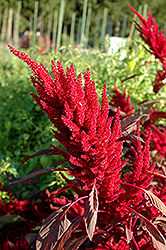Velvet Curtains Amaranthus
Amaranthus caudatus 'Velvet Curtains'
Height: 4 feet
Spread: 3 feet
Sunlight:
![]()
Hardiness Zone: (annual)
Other Names: Love-Lies-Bleeding
Description:
An attractive, eye catching annual or biannual that produces spikes of deep purple flowers above dark crimson leaves, from early summer until fall; perfect as a garden accent, along borders, or in containers
Ornamental Features
Velvet Curtains Amaranthus features bold spikes of deep purple flowers rising above the foliage from early summer to mid fall. The flowers are excellent for cutting. Its textured pointy leaves remain dark red in color throughout the season.
Landscape Attributes
Velvet Curtains Amaranthus is an herbaceous annual with an upright spreading habit of growth. Its relatively coarse texture can be used to stand it apart from other garden plants with finer foliage.
This is a high maintenance plant that will require regular care and upkeep, and should be cut back in late fall in preparation for winter. It has no significant negative characteristics.
Velvet Curtains Amaranthus is recommended for the following landscape applications;
- Accent
- Mass Planting
- General Garden Use
- Container Planting
Planting & Growing
Velvet Curtains Amaranthus will grow to be about 4 feet tall at maturity, with a spread of 3 feet. The flower stalks can be weak and so it may require staking in exposed sites or excessively rich soils. This fast-growing annual will normally live for one full growing season, needing replacement the following year.
This plant should only be grown in full sunlight. It does best in average to evenly moist conditions, but will not tolerate standing water. It is not particular as to soil type or pH. It is somewhat tolerant of urban pollution. This is a selected variety of a species not originally from North America.
Velvet Curtains Amaranthus is a fine choice for the garden, but it is also a good selection for planting in outdoor pots and containers. With its upright habit of growth, it is best suited for use as a 'thriller' in the 'spiller-thriller-filler' container combination; plant it near the center of the pot, surrounded by smaller plants and those that spill over the edges. It is even sizeable enough that it can be grown alone in a suitable container. Note that when growing plants in outdoor containers and baskets, they may require more frequent waterings than they would in the yard or garden.
